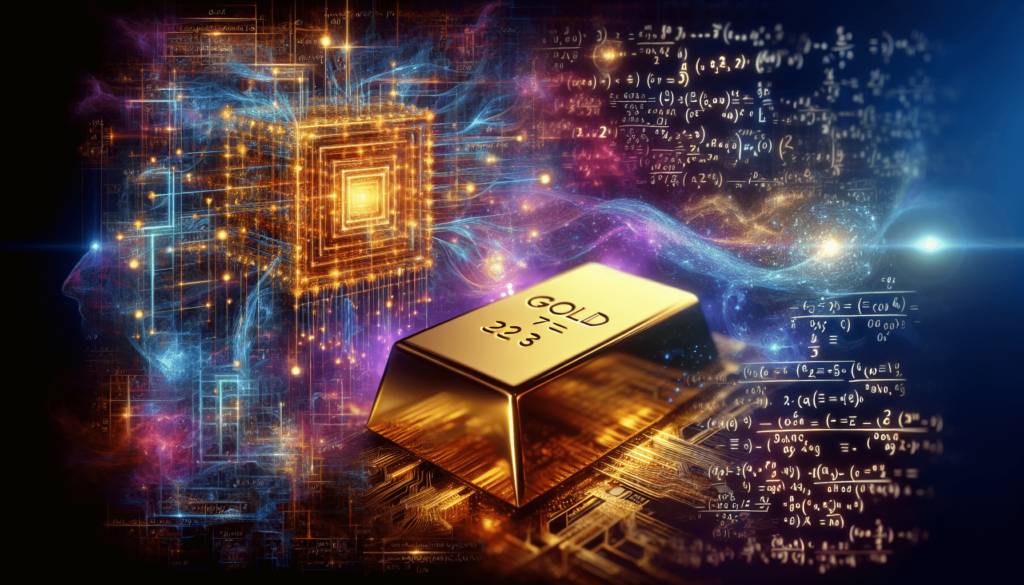Imagine a future where traditional methods of valuing gold seem obsolete. With the rise of quantum computing, a revolutionary technology with unparalleled computational power, the implications on the valuation of gold become increasingly intriguing. This article will explore the potential impact of quantum computing on gold valuation, examining the ways in which this emerging technology could revolutionize our understanding of the precious metal’s worth. From its influence on the mining industry to its ability to refine the accuracy of price forecasts, quantum computing has the potential to reshape the gold market as we know it.
Development of Quantum Computing
Overview of quantum computing
Quantum computing is a rapidly evolving field that utilizes the principles of quantum mechanics to process information and perform complex calculations at an unprecedented speed. Unlike classical computers, which use bits to represent information as either 0 or 1, quantum computers use qubits, which can exist in multiple states simultaneously, thanks to a phenomenon known as superposition. This unique characteristic enables quantum computers to process massive amounts of data simultaneously, leading to the potential for solving complex problems that are beyond the capabilities of existing computing technologies.
Advancements and current state of quantum computing
Over the past few decades, quantum computing has made significant advancements. Researchers have developed various quantum computer architectures, including those based on superconducting circuits, trapped ions, topological qubits, and photonics. These advancements have resulted in a steady increase in the number of qubits, improving the computational power and capabilities of quantum computers. Companies like IBM, Google, and Microsoft are investing heavily in quantum computing research, and quantum supremacy, the point at which quantum computers surpass classical computers in solving certain problems, seems within reach. While practical applications of quantum computing are still in their early stages, the potential impact on various industries, including gold valuation, cannot be overlooked.
Traditional Methods for Gold Valuation
Evaluation of gold based on supply and demand
Gold valuation is primarily driven by the forces of supply and demand in the global market. Supply factors include gold mining production, recycling of gold, and central bank holdings, while demand factors consist of jewelry fabrication, investment demand, and industrial usage. These factors combined create a delicate equilibrium that determines the price of gold. Traditional methods for gold valuation involve analyzing these supply and demand dynamics to estimate the intrinsic value of gold.
Factors affecting gold valuation
Several factors influence the valuation of gold. Economic conditions, such as inflation and interest rates, have a significant impact on gold prices. In times of economic uncertainty, investors often turn to gold as a safe-haven asset, leading to an increase in demand and subsequent price appreciation. Geopolitical events, currency fluctuations, and market sentiment also play crucial roles in determining gold prices. Additionally, technological advancements in mining and refining processes, as well as changes in consumer preferences, can affect the supply and demand dynamics of the gold market.

Challenges in Gold Valuation
Complexity of gold valuation
Gold valuation is a complex process due to the interplay between various economic, political, and market factors. The intricate nature of these factors makes it challenging to accurately predict and assess the value of gold. Traditional valuation methods often rely on historical data, statistical models, and economic indicators, which may not fully capture the dynamic and ever-changing nature of the gold market. As a result, the accuracy and precision of gold valuation can be limited, leading to potential discrepancies in determining its true worth.
Lack of accuracy and precision
Conventional valuation methods for gold heavily depend on human analysis and judgment. While these methods have proven to be effective to a certain extent, they are not immune to potential errors and biases. Human interpretation of data and market trends can introduce subjectivity into the valuation process, leading to inconsistencies and inaccuracies. Furthermore, the reliance on historical data and linear models may not adequately capture the nonlinear and unpredictable nature of the gold market, making it difficult to achieve a high degree of accuracy and precision in gold valuation.
Quantum Computing Potential
Quantum computing’s ability to solve complex problems
One of the most promising aspects of quantum computing is its ability to tackle complex problems that are impractical for classical computers to solve efficiently. Quantum algorithms can leverage the intrinsic parallelism and superposition properties of qubits to efficiently solve optimization, simulation, and cryptography problems. In the context of gold valuation, quantum computing has the potential to revolutionize the analysis of vast amounts of data, enabling more accurate and sophisticated models for valuing gold. By employing quantum algorithms, researchers can explore various valuation scenarios and optimize the decision-making process in real-time.
Speed and efficiency of quantum algorithms
Quantum computing offers the promise of exponential speedup compared to classical computers. Complex calculations that currently take years or even centuries to complete on classical machines could potentially be solved in seconds or minutes by quantum computers. This increased speed and efficiency can have profound implications for gold valuation. With the ability to process and analyze vast amounts of data at an unprecedented rate, quantum computers can significantly accelerate the valuation process, allowing for more frequent and accurate assessments of gold prices. This enhanced efficiency can lead to better market insights and improved decision-making for investors and industry professionals.

Impact on Gold Valuation
Improved accuracy in determining gold value
Quantum computing has the potential to enhance the accuracy of gold valuation by enabling more sophisticated and precise models. With its ability to process vast amounts of data and perform complex calculations simultaneously, quantum computers can analyze multiple factors affecting gold prices simultaneously. By considering a broader range of variables and incorporating nonlinear relationships, quantum algorithms can provide a more comprehensive and accurate assessment of the true value of gold. This improved accuracy in determining gold value can have significant benefits for investors and market participants, allowing for better-informed decisions and reducing the risk of undervaluation or overvaluation.
Forecasting gold trends and market behavior
Another area where quantum computing can have a significant impact on gold valuation is in forecasting future trends and market behavior. Traditional methods often rely on historical trends and statistical models to make predictions, which may overlook hidden patterns or nonlinear relationships. Quantum computers, with their superior processing power and quantum algorithms, can analyze large datasets to identify complex patterns and correlations. This can enable more accurate and reliable predictions of gold price movements, market trends, and the impact of external factors. With this improved forecasting capability, investors and industry professionals can make more informed decisions and develop strategies to optimize their investments in the gold market.
Risks and Uncertainties
Security concerns in quantum computing
While the potential of quantum computing is exciting, it also brings forth security concerns. Quantum computers have the potential to break currently used cryptographic algorithms, which form the backbone of secure communication and transactions. This presents a risk to the integrity of gold transactions and the security of sensitive data in the gold market. To mitigate these risks, quantum-resistant cryptographic techniques need to be developed and implemented to ensure the continued security of gold-related transactions and information.
Potential impact on gold market stability
The advent of quantum computing in gold valuation may also introduce new challenges to the stability of the gold market. As quantum algorithms enable more accurate and efficient valuation models, the market may experience increased volatility and rapid price fluctuations. It is essential to carefully manage the transition and integration of quantum computing techniques into the gold market to ensure stability and minimize undesirable consequences. Regulatory frameworks and risk management strategies need to be established to address these potential risks and uncertainties associated with the adoption of quantum computing in gold valuation.
Integration of Quantum Computing in Gold Valuation
Adoption and implementation challenges
The integration of quantum computing in gold valuation will not be without its challenges. Developing quantum algorithms tailored to gold valuation requires a deep understanding of both quantum computing and the intricacies of the gold market. The scarcity of quantum computing expertise and the need for collaboration between quantum computing experts and gold valuation professionals present significant hurdles. Additionally, the high cost and complexity of quantum computing hardware and infrastructure may limit the widespread adoption and implementation of quantum computing in the gold valuation industry.
Collaboration between experts in quantum computing and gold valuation
To overcome the challenges associated with integrating quantum computing in gold valuation, collaboration between experts in both fields is crucial. Close partnerships between quantum computing researchers, mathematicians, economists, and industry professionals can facilitate the development of quantum algorithms suitable for gold valuation. By combining their knowledge and expertise, these interdisciplinary teams can contribute to the advancement of quantum computing in gold valuation and address the complexities of the gold market effectively.
Future Outlook and Opportunities
Potential disruption and transformation in gold valuation
The integration of quantum computing into gold valuation has the potential to disrupt and transform the way gold is valued. With the ability to process vast amounts of data and perform complex calculations, quantum computers can enhance the accuracy, precision, and efficiency of gold valuation models. This could lead to a more transparent and objective valuation process, minimizing the potential for market manipulation and improving investors’ trust in the gold market. Furthermore, the increased speed and sophistication of valuation techniques enabled by quantum computing can open up new opportunities for innovative investment strategies and financial products centered around gold.
Exploring new valuation models and strategies
The advent of quantum computing in gold valuation also offers the opportunity to explore new valuation models and strategies. Traditional methods heavily rely on linear models and historical data, which may not capture the full complexity of the gold market. Quantum algorithms and computational techniques can handle nonlinear relationships and large datasets, enabling the development of more comprehensive and dynamic valuation models. These new models can incorporate real-time data, sentiment analysis, and advanced data analytics techniques, resulting in more accurate and timely valuations of gold. Moreover, quantum computing can facilitate the optimization of investment portfolios and the development of customized investment strategies tailored to individual risk preferences and investment goals.
Ethical Considerations
Addressing fairness and transparency in gold valuation
As quantum computing technology advances, it is essential to address ethical considerations surrounding fairness and transparency in gold valuation. The use of quantum algorithms and sophisticated computational techniques must be carried out ethically and with proper transparency to ensure that all market participants have equal access to accurate and reliable gold valuations. Efforts must be made to minimize biases, algorithmic discrimination, and unjust market practices that could arise from the integration of quantum computing in gold valuation. Fairness and transparency can be achieved through regulatory oversight, open collaboration, and clear guidelines for the responsible use of quantum computing in the gold valuation process.
Ensuring responsible use of quantum computing technology
As with any powerful technology, the responsible use of quantum computing in the gold valuation process is crucial. Proper safeguards and ethical guidelines must be implemented to maintain data privacy, protect sensitive information, and prevent potential misuse of quantum computing capabilities. Regulatory frameworks need to be established to ensure compliance with ethical standards and safeguard the integrity of the gold market. Industry-wide initiatives and continuous monitoring can help identify and address any issues that may arise from the integration of quantum computing in gold valuation, fostering responsible development and deployment of quantum computing technology.
Conclusion
In conclusion, the implications of quantum computing on gold valuation are significant. The development of quantum computing has paved the way for more accurate, efficient, and sophisticated gold valuation models. With its ability to process vast amounts of data and perform complex calculations, quantum computing has the potential to revolutionize the way gold is valued, enhancing accuracy, precision, and market insights. However, challenges and risks exist, including security concerns and potential market volatility. Collaboration between experts in quantum computing and gold valuation is crucial to ensure responsible integration and optimization of quantum computing techniques in the gold valuation industry. By addressing ethical considerations and exploring new valuation models, the future outlook for quantum computing in gold valuation is promising, promising to reshape and transform the gold market for the better.

